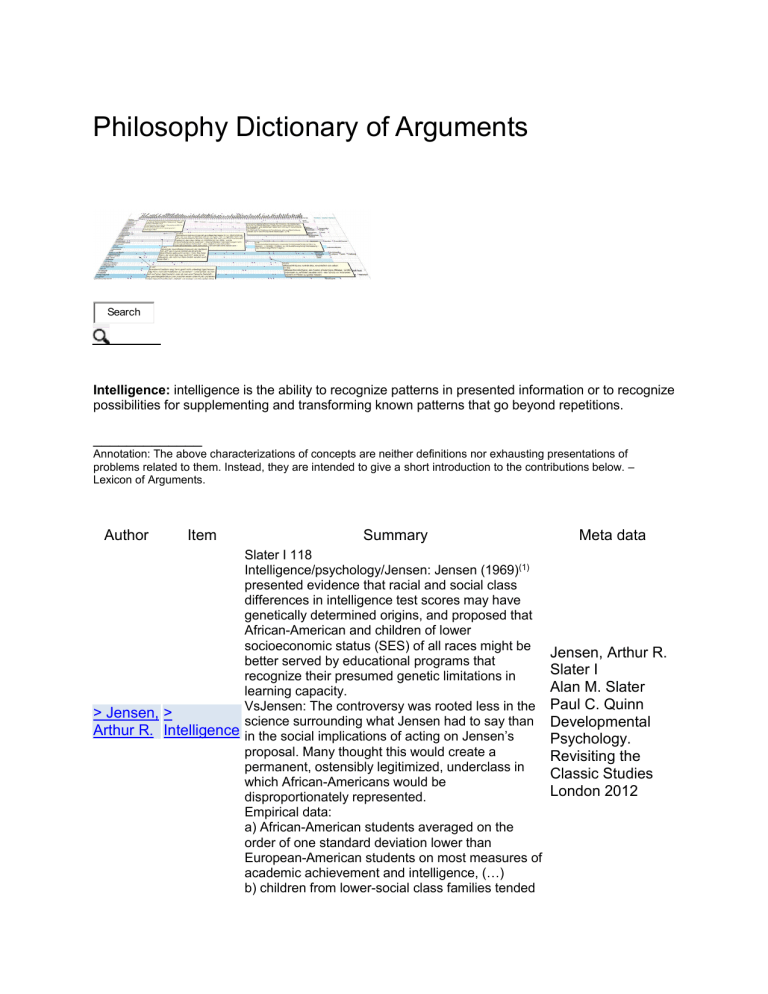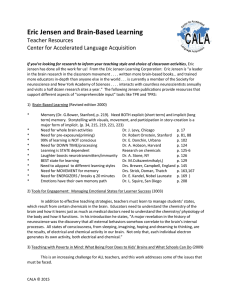Arthur Jensen on Intelligence - Psychology Dictionary of Arguments

Philosophy Dictionary of Arguments
Search
Intelligence: intelligence is the ability to recognize patterns in presented information or to recognize possibilities for supplementing and transforming known patterns that go beyond repetitions.
_____________
Annotation: The above characterizations of concepts are neither definitions nor exhausting presentations of problems related to them. Instead, they are intended to give a short introduction to the contributions below.
–
Lexicon of Arguments.
Author Item Summary Meta data
Slater I 118
Intelligence/psychology/Jensen: Jensen (1969) (1) presented evidence that racial and social class differences in intelligence test scores may have genetically determined origins, and proposed that
African-American and children of lower socioeconomic status (SES) of all races might be better served by educational programs that recognize their presumed genetic limitations in learning capacity.
> Jensen,
Arthur R.
>
VsJensen: The controversy was rooted less in the
Intelligence
science surrounding what Jensen had to say than in the social implications of acting on Jensen’s proposal. Many thought this would create a permanent, ostensibly legitimized, underclass in which African-Americans would be disproportionately represented.
Empirical data: a) African-American students averaged on the order of one standard deviation lower than
European-American students on most measures of academic achieve ment and intelligence, (…) b) children from lower-social class families tended
Jensen, Arthur R.
Slater I
Alan M. Slater
Paul C. Quinn
Developmental
Psychology.
Revisiting the
Classic Studies
London 2012
Philosophy Dictionary of Arguments
Search
Intelligence: intelligence is the ability to recognize patterns in presented information or to recognize possibilities for supplementing and transforming known patterns that go beyond repetitions.
_____________
Annotation: The above characterizations of concepts are neither definitions nor exhausting presentations of problems related to them. Instead, they are intended to give a short introduction to the contributions below.
–
Lexicon of Arguments.
Author Item Meta data Summary more generally to score similarly lower than children from middle- and upper-social class families.
It was these same observations that had led to the development and funding of the Head Start
Program in the United States in 1964, with first implementation as a summer kindergarten readiness program in 1965.
Slater I 119
By 1969 the general optimism that had fueled the
Head Start Program (…) had dissipated. The (…) program (…) was not meeting expectations.
IQ/Jensen 1966(2): Can psychologists and educators raise the national IQ? (…) The genes and the prenatal environment control some 80 per cent of the variance in intelligence. This leaves about 20 per cent to the environment ... The degree of boost that can be effected in any person will, of course, depend on the extent to which his usual environment is less than optimal for the full development of his innate intellectual potential.
(Jensen, 1966 (2) , p. 99).
IQ/Jensen: (Jensen 1967) (3) “This widespread belief
[in cultural disadvantage] gives rise to various plans
Philosophy Dictionary of Arguments
Search
Intelligence: intelligence is the ability to recognize patterns in presented information or to recognize possibilities for supplementing and transforming known patterns that go beyond repetitions.
_____________
Annotation: The above characterizations of concepts are neither definitions nor exhausting presentations of problems related to them. Instead, they are intended to give a short introduction to the contributions below.
–
Lexicon of Arguments.
Author Item Meta data Summary for ... educational programs tailored to the apparent limitations of a large proportion of low socioeconomic status children. This is a harmful and unjust set of beliefs, if acted upon ... (1967 (3)
5).”
p.
JensenVsJensen: (Jensen 1969) (1) two years later,
Jensen recommended exactly that: educational programs tailored to the apparel limitations of minority and low SES (socioeconomic status) children.
United States Commission on Civil Rights: (1967) (3) the US CCR report (…) at the time was heavily criticised, though its basic finding of few or no lasting gains in IQ scores has stood the test of time: Thesis: compensatory education has been tried and it apparently has failed (quoted in Jensen
(1969 (1) p. 1.
Jensen (1969): the premise needs revisiting.
Slater I 120
Solution/Jensen: (Jensen 1969) (1) : society should use [the conclusion, that group or racial differences in levels of IQ are genetically determined] as the basis for designing educational programs that recognized presumably inherent and permanent
Philosophy Dictionary of Arguments
Search
Intelligence: intelligence is the ability to recognize patterns in presented information or to recognize possibilities for supplementing and transforming known patterns that go beyond repetitions.
_____________
Annotation: The above characterizations of concepts are neither definitions nor exhausting presentations of problems related to them. Instead, they are intended to give a short introduction to the contributions below.
–
Lexicon of Arguments.
Author Item Meta data Summary racial and socioeconomic (SES) differences in capacity to benefit from education. > Intelligence tests/Jensen .
1. Jensen, A. R. (1969). How much can we boost
IQ and scholastic achievement? Harvard
Educational Review, 3, 1 –123.
2. Jensen, A. R. (1966). Verbal mediation and educational potential. Psychology in the Schools, 3,
99 –109.
3. Jensen, A. R. (1967). The culturally disadvantaged: Psychological and educational aspects. Educational Research, 10, 4 –20.
Wendy Johnson: „How Much Can We Boost IQ?
Updat ed Look at Jensen’s (1969) Question and
Answer“, in: Alan M. Slater & Paul C. Quinn (eds.)
2012. Developmental Psychology. Revisiting the
Classic Studies. London: Sage Publications
_____________
Philosophy Dictionary of Arguments
Search
Intelligence: intelligence is the ability to recognize patterns in presented information or to recognize possibilities for supplementing and transforming known patterns that go beyond repetitions.
_____________
Annotation: The above characterizations of concepts are neither definitions nor exhausting presentations of problems related to them. Instead, they are intended to give a short introduction to the contributions below.
–
Lexicon of Arguments.
Author Item Meta data Summary
Explanation of symbols: Roman numerals indicate the source, arabic numerals indicate the page number. The corresponding books are indicated on the right hand side. ((s)…): Comment by the sender of the contribution.
The note [Author1]Vs[Author2] or [Author]Vs[term] is an addition from the Dictionary of Arguments. If a German edition is specified, the page numbers refer to this edition.
> Counter arguments against Jensen
Authors A B C D E F G H I J K L M N O P Q R S T U V W Z
Concepts A B C D E F G H I J K L M N O P Q R S T U V W Z
Home
List view
Tables
Ed. Martin Schulz,
Legal Notice Contact Data protection declaration



